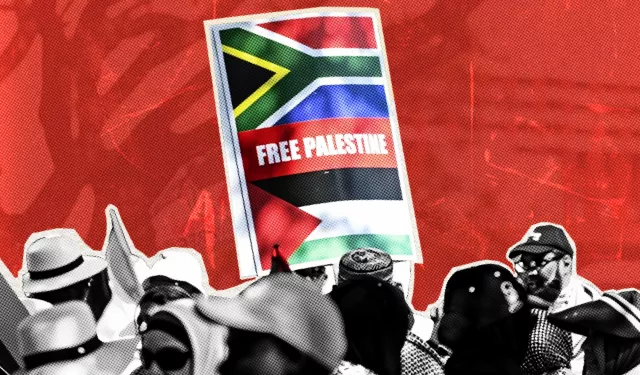
Will Israel end the same way as Apartheid?
As Israel’s assault on the Gaza Strip continues, a growing international consensus is forming against the occupying state’s policies towards Palestinians in all occupied territories. The shift is visible in rising diplomatic friction with Western capitals that, until very recently, offered Israel a high degree of support.
Recognition of a Palestinian state by major European players like France and the UK, along with Canada, may have limited effect on the ground. Real change, however, might come if these states turn words into action by imposing military and economic sanctions on Israel.
The key question is whether these governments have enough leverage to turn the widely endorsed two-state framework into actual policy, instead of a slogan with few concrete steps behind it.
From arms bans to trade curbs
In recent months, several states have moved to suspend arms exports to Israel, most notably Germany, the second-largest supplier to the occupation state after the US. These moves signal that the arms trade is no longer off-limits to political pressure.
At the same time, the EU’s top foreign policy official recommended suspending some or all parts of the EU–Israel association agreement. The idea surfaced earlier but stalled because member states including Germany and Hungary opposed it.
If adopted, such a suspension would subject about one-third of Israel’s foreign trade to higher tariffs.
Israel’s international isolation is not only about governments. Civil society groups have stepped up calls to bar Israeli participation in international sports and cultural events. Activists have also participated directly by launching flotillas to break Gaza’s blockade, and protests have been frequent in countries that protect freedoms of assembly and expression.
How Apartheid ended
Supporters of the Palestinian cause argue that the growing backlash to Israel’s mass killing, starvation, displacement, and settlement expansion could put Israel on a path similar to the experience of South Africa in ending Apartheid—the system of legal racial separation enforced by a white minority over a Black African majority from 1948 to 1994.
In South Africa, an international consensus formed early against this racial order, which codified segregation between whites and the African and Asian majority and deprived the majority of access to opportunities and resources.
From the start, the Apartheid regime faced economic, diplomatic and cultural sanctions from newly independent states such as India, as well as the Soviet Union and the People’s Republic of China. At the same time, South Africa received support from several European governments and the US due to its perceived role in containing communism during the Cold War.
Western positions began to shift in the 1980s, as the Cold War neared end. Major economies like Germany and the UK adopted trade sanctions, followed by the US in 1986. Although President Ronald Reagan opposed them, Congress overrode his veto and passed a law that isolated South Africa until it implemented political reform.
Sanctions spread across Western economies while both armed and nonviolent resistance grew, led by the African National Congress/ANC and its allies, along with Black trade unions. Church and faith groups expanded the movement. At the same time, prices for South Africa’s main commodity exports, especially coal and minerals, fell. The downturn became a debt crisis that made the economy more vulnerable to shocks from sanctions.
These pressures deepened splits within the white ruling elite and strengthened a more moderate faction willing to negotiate with the ANC, including the release of its historic leader, Nelson Mandela. Major South African firms with interests in international markets, including foreign investments, banks, and credit funds, supported this shift.
Mandela’s release in 1990 opened a long negotiation that led to South Africa’s first election under universal suffrage in 1994. The vote ended Apartheid through a negotiated transition and created a new political order under ANC leadership. Today, South Africa plays a visible role leading the Global South’s advocacy for Palestinian rights, including legal efforts to hold Israel accountable for alleged genocide in Gaza.
What about Israel?
Against this brief overview of South Africa’s transition from Apartheid to democracy, three questions shape today’s debate on sanctioning Israel.
First, is Israel actually on South Africa’s path or, put differently, how far can the new international consensus go? Could sanctions come not only from the EU but also from other major economic blocs like China and India? Might the US shift its stance as support for Palestinian rights grows within the Democratic Party?
Second, assuming that Israel’s isolation hardens into sanctions on trade, investment and access to credit, as happened with South Africa, what tools could deter ongoing settlement expansion and forced displacement? What steps could help secure equal legal rights for Palestinians, either in an independent or a bi-national state?
Third, because sanctions alone did not end Apartheid, what other elements would need to come together in the next few years to change the situation for Palestinians in Israel?
In future essays, I will address each question in turn, drawing lessons from South Africa and investigating what is comparable in the contemporary Israeli case.
There are no definitive answers. The analysis assumes that the world, especially Israel’s Western economic, political and military partners, chooses to move in this direction. Still, the mental exercise of asking these questions and offering provisional answers through the South African lens is useful. Perhaps a new state of affairs would prevail.
Published opinions reflect the views of its authors, not necessarily those of Al Manassa.
